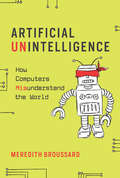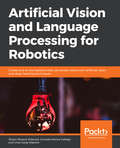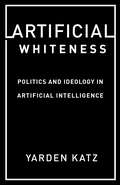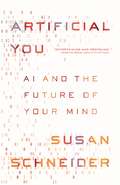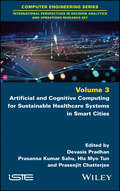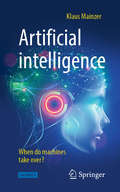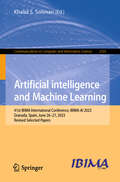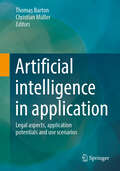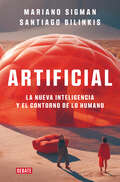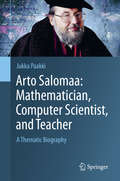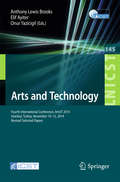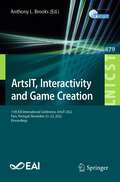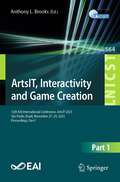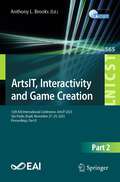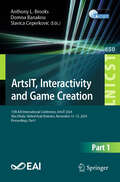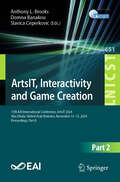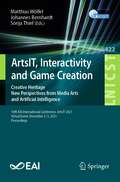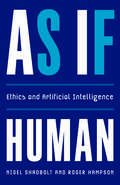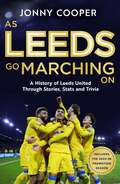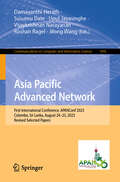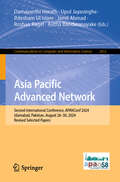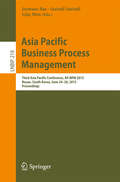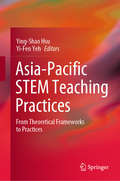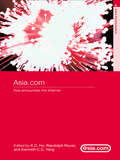- Table View
- List View
Artificial Unintelligence: How Computers Misunderstand the World (The\mit Press Ser.)
by Meredith BroussardA guide to understanding the inner workings and outer limits of technology and why we should never assume that computers always get it right.In Artificial Unintelligence, Meredith Broussard argues that our collective enthusiasm for applying computer technology to every aspect of life has resulted in a tremendous amount of poorly designed systems. We are so eager to do everything digitally—hiring, driving, paying bills, even choosing romantic partners—that we have stopped demanding that our technology actually work. Broussard, a software developer and journalist, reminds us that there are fundamental limits to what we can (and should) do with technology. With this book, she offers a guide to understanding the inner workings and outer limits of technology—and issues a warning that we should never assume that computers always get things right.Making a case against technochauvinism—the belief that technology is always the solution—Broussard argues that it's just not true that social problems would inevitably retreat before a digitally enabled Utopia. To prove her point, she undertakes a series of adventures in computer programming. She goes for an alarming ride in a driverless car, concluding “the cyborg future is not coming any time soon”; uses artificial intelligence to investigate why students can't pass standardized tests; deploys machine learning to predict which passengers survived the Titanic disaster; and attempts to repair the U.S. campaign finance system by building AI software. If we understand the limits of what we can do with technology, Broussard tells us, we can make better choices about what we should do with it to make the world better for everyone.
Artificial Vision and Language Processing for Robotics: Create end-to-end systems that can power robots with artificial vision and deep learning techniques
by Álvaro Morena Alberola Gonzalo Molina Gallego Unai Garay MaestreCreate end-to-end systems that can power robots with artificial vision and deep learning techniquesKey FeaturesStudy ROS, the main development framework for robotics, in detailLearn all about convolutional neural networks, recurrent neural networks, and roboticsCreate a chatbot to interact with the robotBook DescriptionArtificial Vision and Language Processing for Robotics begins by discussing the theory behind robots. You'll compare different methods used to work with robots and explore computer vision, its algorithms, and limits. You'll then learn how to control the robot with natural language processing commands. You'll study Word2Vec and GloVe embedding techniques, non-numeric data, recurrent neural network (RNNs), and their advanced models. You'll create a simple Word2Vec model with Keras, as well as build a convolutional neural network (CNN) and improve it with data augmentation and transfer learning. You'll study the ROS and build a conversational agent to manage your robot. You'll also integrate your agent with the ROS and convert an image to text and text to speech. You'll learn to build an object recognition system using a video.By the end of this book, you'll have the skills you need to build a functional application that can integrate with a ROS to extract useful information about your environment.What you will learnExplore the ROS and build a basic robotic systemUnderstand the architecture of neural networksIdentify conversation intents with NLP techniquesLearn and use the embedding with Word2Vec and GloVeBuild a basic CNN and improve it using generative modelsUse deep learning to implement artificial intelligence(AI)and object recognitionDevelop a simple object recognition system using CNNsIntegrate AI with ROS to enable your robot to recognize objectsWho this book is forArtificial Vision and Language Processing for Robotics is for robotics engineers who want to learn how to integrate computer vision and deep learning techniques to create complete robotic systems. It will prove beneficial to you if you have working knowledge of Python and a background in deep learning. Knowledge of the ROS is a plus.
Artificial Whiteness: Politics and Ideology in Artificial Intelligence
by Yarden KatzDramatic statements about the promise and peril of artificial intelligence for humanity abound, as an industry of experts claims that AI is poised to reshape nearly every sphere of life. Who profits from the idea that the age of AI has arrived? Why do ideas of AI’s transformative potential keep reappearing in social and political discourse, and how are they linked to broader political agendas?Yarden Katz reveals the ideology embedded in the concept of artificial intelligence, contending that it both serves and mimics the logic of white supremacy. He demonstrates that understandings of AI, as a field and a technology, have shifted dramatically over time based on the needs of its funders and the professional class that formed around it. From its origins in the Cold War military-industrial complex through its present-day Silicon Valley proselytizers and eager policy analysts, AI has never been simply a technical project enabled by larger data and better computing. Drawing on intimate familiarity with the field and its practices, Katz instead asks us to see how AI reinforces models of knowledge that assume white male superiority and an imperialist worldview. Only by seeing the connection between artificial intelligence and whiteness can we prioritize alternatives to the conception of AI as an all-encompassing technological force.Bringing together theories of whiteness and race in the humanities and social sciences with a deep understanding of the history and practice of science and computing, Artificial Whiteness is an incisive, urgent critique of the uses of AI as a political tool to uphold social hierarchies.
Artificial You: AI and the Future of Your Mind
by Susan SchneiderA sober-minded philosophical exploration of what AI can and cannot achieveHumans may not be Earth’s most intelligent beings for much longer: the world champions of chess, Go, and Jeopardy! are now all AIs. Given the rapid pace of progress in AI, many predict that it could advance to human-level intelligence within the next several decades. From there, it could quickly outpace human intelligence. What do these developments mean for the future of the mind?In Artificial You, Susan Schneider says that it is inevitable that AI will take intelligence in new directions, but urges that it is up to us to carve out a sensible path forward. As AI technology turns inward, reshaping the brain, as well as outward, potentially creating machine minds, it is crucial to beware. Homo sapiens, as mind designers, will be playing with "tools" they do not understand how to use: the self, the mind, and consciousness. Schneider argues that an insufficient grasp of the nature of these entities could undermine the use of AI and brain enhancement technology, bringing about the demise or suffering of conscious beings. To flourish, we must grasp the philosophical issues lying beneath the algorithms.At the heart of her exploration is a sober-minded discussion of what AI can truly achieve: Can robots really be conscious? Can we merge with AI, as tech leaders like Elon Musk and Ray Kurzweil suggest? Is the mind just a program? Examining these thorny issues, Schneider proposes ways we can test for machine consciousness, questions whether consciousness is an unavoidable byproduct of sophisticated intelligence, and considers the overall dangers of creating machine minds.
Artificial and Cognitive Computing for Sustainable Healthcare Systems in Smart Cities
by Prasenjit Chatterjee Devasis Pradhan Prasanna Kumar Sahu Hla Myo TunArtificial and Cognitive Computing for Sustainable Healthcare Systems in Smart Cities delves into the transformative potential of artificial and cognitive computing in the realm of healthcare systems, maintaining a specific emphasis on sustainability. By exploring the integration of advanced technologies in smart cities, the authors examine and discuss how AI and cognitive computing can be harnessed to enhance healthcare delivery. The book provides focused navigation through innovative solutions and strategies that contribute to the creation of sustainable healthcare ecosystems within the dynamic environment of smart cities. From optimizing resource utilization to improving patient outcomes, this comprehensive exploration provides insight for readers with an interest in the future of healthcare within the era of intelligent urban development.
Artificial intelligence - When do machines take over? (Technik im Fokus)
by Klaus MainzerEverybody knows them. Smartphones that talk to us, wristwatches that record our health data, workflows that organize themselves automatically, cars, airplanes and drones that control themselves, traffic and energy systems with autonomous logistics or robots that explore distant planets are technical examples of a networked world of intelligent systems. Machine learning is dramatically changing our civilization. We rely more and more on efficient algorithms, because otherwise we will not be able to cope with the complexity of our civilizing infrastructure. But how secure are AI algorithms? This challenge is taken up in the 2nd edition: Complex neural networks are fed and trained with huge amounts of data (big data). The number of necessary parameters explodes exponentially. Nobody knows exactly what is going on in these "black boxes". In machine learning we need more explainability and accountability of causes and effects in order to be able to decide ethical and legal questions of responsibility (e.g. in autonomous driving or medicine)! Besides causal learning, we also analyze procedures of tests and verification to get certified AI-programs. Since its inception, AI research has been associated with great visions of the future of mankind. It is already a key technology that will decide the global competition of social systems. "Artificial Intelligence and Responsibility" is another central supplement to the 2nd edition: How should we secure our individual liberty rights in the AI world? This book is a plea for technology design: AI must prove itself as a service in society.
Artificial intelligence and Machine Learning: 41st IBIMA International Conference, IBIMA-AI 2023, Granada, Spain, June 26–27, 2023, Revised Selected Papers (Communications in Computer and Information Science #2101)
by Khalid S. SolimanThis book constitutes the revised selected papers of the 41st IBIMA International Conference on Artificial intelligence and Computer Science, IBIMA-AI 2023, which took place in Granada, Spain during June 26-27, 2023. The 30 full papers and 8 short papers included in this volume were carefully reviewed and selected from 58 submissions. The book showcases a diverse array of research papers spanning various disciplines within the realm of Artificial Intelligence, Machine Learning, Information Systems, Communications Technologies, Software Engineering, and Security and Privacy.
Artificial intelligence in application: Legal aspects, application potentials and use scenarios
by Thomas Barton Christian MüllerThe book shows application potentials of artificial intelligence in various industries and presents application scenarios on how a practical implementation can take place. The starting point is the description of legal aspects, which includes a European regulation for artificial intelligence and addresses the question of the permissibility of automated decisions. The description of various application potentials, mostly industry-related, and the presentation of some application scenarios form the focus of the topic volume. The book is based on the question of how artificial intelligence can be used in entrepreneurial practice. It offers important information that is just as relevant for practitioners as for students and teachers. This book is a translation of an original German edition. The translation was done with the help of artificial intelligence (machine translation by the service DeepL.com). A subsequent human revision was done primarily in terms of content, so that the book will read stylistically differently from a conventional translation.
Artificial: La nueva inteligencia y el contorno de lo humano
by Santiago Bilinkis Mariano SigmanIdeas, herramientas y preguntas para aproximarse a la inteligencia artificial sin miedo, de la mano de Mariano Sigman, uno de los neurocientíficos más destacados del mundo, y Santiago Bilinkis, emprendedor y tecnólogo. Este no es un libro de oráculos o vaticinios, sino las reflexiones de dos autores que consideran que estar informados es la mejor forma de navegar la indefectible ola de la inteligencia artificial. En una conversación tan lúcida como estimulante, el neurocientífico superventas Mariano Sigman y el emprendedor Santiago Bilinkis repasan el origen, las utilidades y los riesgos de esta tecnología. ¿Será una lámpara de Aladino o una caja de Pandora? ¿Cómo acercarnos al mejor escenario? ¿Estamos caminando al borde del precipicio? ¿Qué ocurrirá si la inteligencia artificial encuentra aquello en lo que somos más débiles? Si bien exponen las razones por las que debemos ser cautos y responsables, huyen del pesimismo y nos invitan a pensar que de este desafío podemos sacar nuestra mejor versión.
Arto Salomaa: A Thematic Biography
by Jukka PaakkiThis book outlines the scientific career of Arto Salomaa, a pioneer in theoretical computer science and mathematics. The author first interviewed the subject and his family and collaborators, and he then researched this fascinating biography of an intellectual who was key in the development of these fields.Early chapters progress chronologically from Academician Salomaa's origins, childhood, and education to his professional successes in science, teaching, and publishing. His most impactful direct research efforts have been in the areas of automata and formal languages. Beyond that he has influenced many more scientists and professionals through collaborations, teaching, and books on topics such as biocomputing and cryptography. The author offers insights into Finnish history, culture, and academia, while historians of computer science will appreciate the vignettes describing some of the people who have shaped the field from the 1950s to today. The author and his subject return throughout to underlying themes such as the importance of family and the value of longstanding collegial relationships, while the work and achievements are leavened with humor and references to interests such as music, sport, and the sauna.
Arts and Technology: Fourth International Conference, ArtsIT 2014, Istanbul, Turkey, November 10-12, 2014, Revised Selected Papers (Lecture Notes of the Institute for Computer Sciences, Social Informatics and Telecommunications Engineering #145)
by Anthony Lewis Brooks Elif Ayiter Onur YazicigilThis book constitutes the thoroughly refereed proceedings of the Fourth International Conference on Arts and Technology, ArtsIT 2014, held in Istanbul, Turkey, in November 2014. The 17 revised full papers presented were carefully selected and reviewed from numerous submissions. ArtsIT has become a leading scientific forum for the dissemination of cutting-edge research results in the area of arts, design and technology. The papers focus on IT technologies, artists, designers and industrial members and offer content creators tools that expand the means of expression of the traditional design field.
ArtsIT, Interactivity and Game Creation: 11th EAI International Conference, ArtsIT 2022, Faro, Portugal, November 21-22, 2022, Proceedings (Lecture Notes of the Institute for Computer Sciences, Social Informatics and Telecommunications Engineering #479)
by Anthony L. BrooksThis book constitutes the refereed post-conference proceedings the 11th EAI International Conference on ArtsIT, Interactivity and Game Creation, ArtsIT 2022 which was held in Faro, Portugal, November 21-22, 2022. The 45 revised full papers presented were carefully selected from 118 submissions. The papers are thematically arranged in the following sections: Dialogues Between Geometry, Computer Graphics and the Visual Arts; Games and Gamification; Museums and the Virtual; Animation, AI, Books and Behavior; Fluency, Fashion, Emotion and Play; Movement, Film and Audio.
ArtsIT, Interactivity and Game Creation: 12th EAI International Conference, ArtsIT 2023, São Paulo, Brazil, November 27-29, 2023, Proceedings, Part I (Lecture Notes of the Institute for Computer Sciences, Social Informatics and Telecommunications Engineering #564)
by Anthony L. BrooksThis book constitutes the refereed post-conference proceedings the 12th EAI International Conference on ArtsIT, Interactivity and Game Creation, ArtsIT 2023 which was held in São Paulo, Brazil, in November 27-29, 2023. The 40 revised full papers and 1 Short paper presented were carefully selected from 103 submissions. The papers are thematically arranged in the following sections: Part I: exploring new frontiers in music therapy; network dance and technology; computational art and the creative process.Part II: alternative realities, immersion experiences, and arts-based research; games; interactive technologies, multimedia, and musical art; human at centre.
ArtsIT, Interactivity and Game Creation: 12th EAI International Conference, ArtsIT 2023, São Paulo, Brazil, November 27-29, 2023, Proceedings, Part II (Lecture Notes of the Institute for Computer Sciences, Social Informatics and Telecommunications Engineering #565)
by Anthony L. BrooksThis book constitutes the refereed post-conference proceedings the 12th EAI International Conference on ArtsIT, Interactivity and Game Creation, ArtsIT 2023 which was held in São Paulo, Brazil, in November 27-29, 2023.The 40 revised full papers and 1 Short paper presented were carefully selected from 103 submissions. The papers are thematically arranged in the following sections: Part I: exploring new frontiers in music therapy; network dance and technology; computational art and the creative process; alternative realities, immersion experiences, and arts-based research.Part II: alternative realities, immersion experiences, and arts-based research; games; interactive technologies, multimedia, and musical art; human at centre.
ArtsIT, Interactivity and Game Creation: 13th EAI International Conference, ArtsIT 2024, Abu Dhabi, United Arab Emirates, November 13–15, 2024, Proceedings, Part I (Lecture Notes of the Institute for Computer Sciences, Social Informatics and Telecommunications Engineering #650)
by Anthony L. Brooks Domna Banakou Slavica CeperkovicThis volume constitutes the proceedings of the 13th EAI International Conference on ArtsIT, Interactivity and Game Creation, ArtsIT 2024, in Abu Dhabi, United Arab Emirates, during November 13–15, 2024. The 38 full papers and 4 short papers were presented in this volume were carefully reviewed and selected from 112 submissions. The papers are thematically arranged in the following sections: Part I: Art & Games; Technical; Education, Co-Creativity in multi-modal interaction with generative AI. Part II: Amplifying Creativity: Exploring Digital Musical Interfaces; Illuminating Realities: Creating immersive spaces to promote mindfulness and wellbeing; Posters.
ArtsIT, Interactivity and Game Creation: 13th EAI International Conference, ArtsIT 2024, Abu Dhabi, United Arab Emirates, November 13–15, 2024, Proceedings, Part II (Lecture Notes of the Institute for Computer Sciences, Social Informatics and Telecommunications Engineering #651)
by Anthony L. Brooks Domna Banakou Slavica CeperkovicThis volume constitutes the proceedings of the 13th EAI International Conference on ArtsIT, Interactivity and Game Creation, ArtsIT 2024, in Abu Dhabi, United Arab Emirates, during November 13–15, 2024. The 38 full papers and 4 short papers were presented in this volume were carefully reviewed and selected from 112 submissions. The papers are thematically arranged in the following sections: Part I: Art & Games; Technical; Education, Co-Creativity in multi-modal interaction with generative AI. Part II: Amplifying Creativity: Exploring Digital Musical Interfaces; Illuminating Realities: Creating immersive spaces to promote mindfulness and wellbeing; Posters.
ArtsIT, Interactivity and Game Creation: Creative Heritage. New Perspectives from Media Arts and Artificial Intelligence. 10th EAI International Conference, ArtsIT 2021, Virtual Event, December 2-3, 2021, Proceedings (Lecture Notes of the Institute for Computer Sciences, Social Informatics and Telecommunications Engineering #422)
by Matthias Wölfel Johannes Bernhardt Sonja ThielThis book constitutes the refereed post-conference proceedings of the 10th EAI International Conference on ArtsIT, Interactivity and Game Creation, ArtsIT 2021 which was held in December 2021. Due to COVID-19 pandemic the conference was held virtually. The 31 revised full papers presented were carefully selected from 57 submissions. The papers are thematically arranged in the following sections: Media Arts and Virtual Reality; Games; Fusions; Collaboration, Inclusion and Participation; Artificial Intelligence in Art and Culture; Approaches and Applications.
As If Human: Ethics and Artificial Intelligence
by Nigel Shadbolt Roger HampsonA new approach to the challenges surrounding artificial intelligence that argues for assessing AI actions as if they came from a human being Intelligent machines present us every day with urgent ethical challenges. Is the facial recognition software used by an agency fair? When algorithms determine questions of justice, finance, health, and defense, are the decisions proportionate, equitable, transparent, and accountable? How do we harness this extraordinary technology to empower rather than oppress? Despite increasingly sophisticated programming, artificial intelligences share none of our essential human characteristics—sentience, physical sensation, emotional responsiveness, versatile general intelligence. However, Nigel Shadbolt and Roger Hampson argue, if we assess AI decisions, products, and calls for action as if they came from a human being, we can avert a disastrous and amoral future. The authors go beyond the headlines about rampant robots to apply established moral principles in shaping our AI future. Their new framework constitutes a how-to for building a more ethical machine intelligence.
As Leeds Go Marching On: A History of Leeds United Through Stories, Stats and Trivia
by Jonny CooperAs any Leeds United fan will tell you, following the Whites is certainly never boring. Almost as famous for their periods of chaos as for their moments of glory, over the years supporters have been left exhilarated and exasperated in equal measure - whilst remaining one of the most passionate fanbases in the world.Now, as Leeds celebrate their return to the Premier League, renowned Opta statistician and lifelong fan Jonny Cooper digs into the numbers and stats to present an alternative history of the club, from the glory of the Revie years right through to lifting the Championship trophy under Daniel Farke - via the title win of 92, never-ending play-off heartbreak, a brief visit to League One and, of course, the Marcelo Bielsa era.With a unique blend of stats and analysis, quirky insights, player records and a view from the terraces, this treasure trove of trivia is full of the good, the bad and the downright weird from the world of Leeds United. A football book unlike any other, this is the ultimate celebration of one of England's most historic - and unique - clubs.INCLUDES THE STORY OF THE 2024-25 PROMOTION SEASON
As Leeds Go Marching On: A History of Leeds United Through Stories, Stats and Trivia
by Jonny CooperAs any Leeds United fan will tell you, following the Whites is certainly never boring. Almost as famous for their periods of chaos as for their moments of glory, over the years supporters have been left exhilarated and exasperated in equal measure - whilst remaining one of the most passionate fanbases in the world.Now, as Leeds celebrate their return to the Premier League, renowned Opta statistician and lifelong fan Jonny Cooper digs into the numbers and stats to present an alternative history of the club, from the glory of the Revie years right through to lifting the Championship trophy under Daniel Farke - via the title win of 92, never-ending play-off heartbreak, a brief visit to League One and, of course, the Marcelo Bielsa era.With a unique blend of stats and analysis, quirky insights, player records and a view from the terraces, this treasure trove of trivia is full of the good, the bad and the downright weird from the world of Leeds United. A football book unlike any other, this is the ultimate celebration of one of England's most historic - and unique - clubs.INCLUDES THE STORY OF THE 2024-25 PROMOTION SEASON
Asia Pacific Advanced Network: 56th International Conference, APANConf 2023, Colombo, Sri Lanka, August 24–25, 2023, Revised Selected Papers (Communications in Computer and Information Science #1995)
by Vijaykrishnan Narayanan Damayanthi Herath Susumu Date Upul Jayasinghe Roshan Ragel Jilong WangThis book constitutes the refereed proceedings of the 56th International Conference onAsia Pacific Advanced Network, APANConf 2023, held in, Colombo, Sri Lanka,during August 24–25, 2023.The 10 full papers and 1 short papers included in this book were carefully reviewed andselected from 37 submissions. They are organized in topical sections as follows: artificial intelligence and machine learning, accelerated computing and distributed systems and communications and networking.
Asia Pacific Advanced Network: Second International Conference, APANConf 2024, Islamabad, Pakistan, August 26–30, 2024, Revised Selected Papers (Communications in Computer and Information Science #2412)
by Jamil Ahmad Damayanthi Herath Upul Jayasinghe Roshan Ragel Ihtesham Ul Islam Asitha BandaranayakeThis book constitutes the refereed proceedings of the Second International Conference on Asia Pacific Advanced Network, APANConf 2024, held in Islamabad, Pakistan, during August 26–30, 2024. The 14 full papers and 1 short paper included in this book were carefully reviewed and selected from 56 submissions. These papers focus on Artificial Intelligence and Machine Learning, Computer Vision and Wireless Communications and Networks.
Asia Pacific Business Process Management: Third Asia Pacific Conference, AP-BPM 2015, Busan, South Korea, June 24-26, 2015, Proceedings (Lecture Notes in Business Information Processing #219)
by Joonsoo Bae Suriadi Suriadi Lijie WenThis book constitutes the proceedings of the Third Asia Pacific Conference on Business Process Management held in Busan, South Korea, in June 2015. Overall, 37 contributions from ten countries were submitted. After each submission was reviewed by at least three Program Committee members, 12 full and two short papers were accepted for publication in this volume. These papers cover various topics and are categorized under four main research focuses in BPM: advancement in workflow technologies, resources allocation strategies, process mining, and emerging topics in BPM.
Asia-Pacific STEM Teaching Practices: From Theoretical Frameworks to Practices
by Ying-Shao Hsu Yi-Fen YehThis book offers various perspectives on the complex and crosscutting concepts of the science, technology, engineering, and mathematics (STEM) disciplines in the classroom context. Presenting empirical studies, it reveals how researchers in the Asia-Pacific Region planned and implemented STEM education in the classroom. Further, it discusses the assessment of STEM learning to clarify what important elements should be included and how researchers and educators frame and design assessment tools. The book consists of four parts: potential and trends in STEM education; teachers’ practical knowledge for STEM teaching; STEM teaching practices; and assessment of STEM learning. Providing evidence on developing curriculums, implementing instructional practices and educating classroom teachers, it is intended for readers wanting to explore STEM education from multiple perspectives.
Asia.com: Asia Encounters the Internet (Asia's Transformations/Asia.com)
by K. C. Ho Randolph Kluver Kenneth C.C. YangThe internet is developing quicker in Asia than in any other region of the world. This book is the first comprehensive analysis of the information society in an Asian context, and the impact of these technologies in Asia. These impacts are inevitably uneven and conditioned by issues of telecommunications infrastructure, government policies, cultural and social values, and economic realities. The combination of original research, theoretical innovation and detailed case studies make this an important book for scholars and students in Asian studies, media studies, communication studies and sociology.
